Introduction
In the rapidly evolving landscape of accounting, the integration of advanced IT services has become paramount for firms aiming to enhance operational efficiency and ensure compliance. With the advent of cloud computing, accountants can now manage financial data with unprecedented flexibility, allowing teams to collaborate seamlessly from any location. This article delves into the essential features of IT services tailored specifically for accountants, exploring how these technologies not only streamline workflows but also fortify data security against rising cyber threats.
Additionally, it examines the strategic advantages of outsourcing and the pivotal role of managed IT services in fostering a proactive approach to technology management. By understanding these dynamics, accounting professionals can position themselves to navigate the complexities of modern financial environments with confidence and agility.
Understanding IT Services Tailored for Accountants
IT solutions customized for accountants encompass a comprehensive suite of advanced technologies and support systems designed to address the distinct operational challenges faced by accounting professionals. These services prominently feature cloud computing, which allows firms to access and manage data from any location, enhancing flexibility and collaboration among teams. Data management systems are essential for organizing and analyzing vast amounts of monetary information, ensuring accuracy and timely reporting. Moreover, robust cybersecurity solutions safeguard sensitive monetary data from rising threats, providing peace of mind in compliance with regulatory standards.
Specialized software applications for financial reporting and tax compliance streamline workflows and minimize human error, fostering a more efficient financial process. The integration of automation and artificial intelligence (AI) into these systems significantly reduces the time spent on repetitive tasks, enabling staff to focus on strategic decision-making and higher-level advisory services. This shift is crucial, as nearly 82% of businesses recognize that technology-savvy clients are better equipped to navigate economic uncertainties, including inflation and fluctuating interest rates.
As companies increasingly adopt cloud-based financial solutions, they are leaving behind traditional desktop software in favor of more agile, scalable options. This transition not only improves operational efficiency but also enables companies to better meet the evolving needs of their clients. For example, outsourcing has become a strategic asset for numerous accounting firms, enabling them to transfer compliance tasks and allocate more resources to providing enhanced offerings. Recent statistics indicate that 98% of companies have outsourced at least part of their work, with the most common services being financial statement preparation and accounts management. This trend enables businesses to scale their operations effectively while reducing risk, ultimately driving growth and profitability.
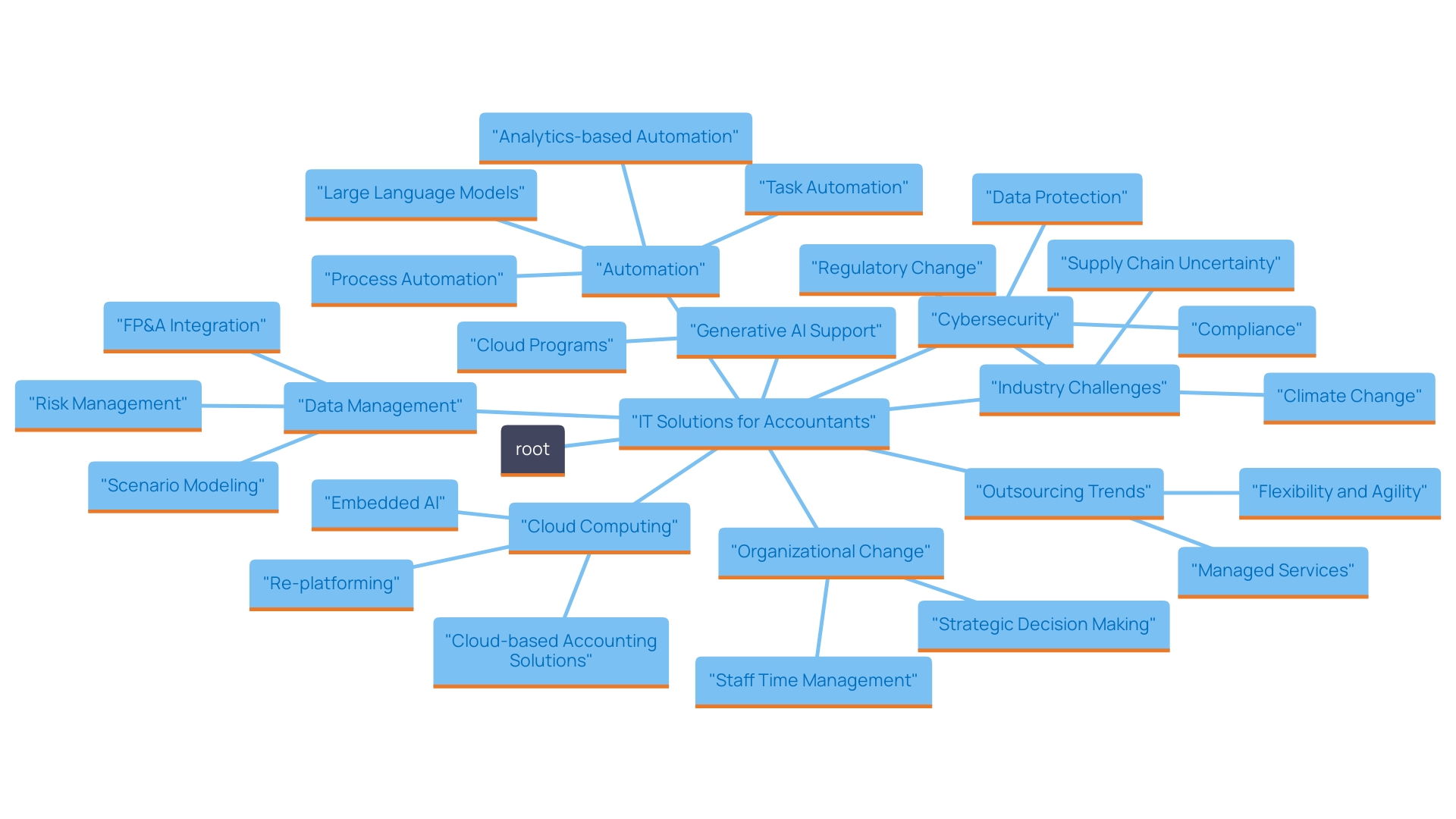
Key Benefits of IT Support for Accounting Firms
The implementation of IT assistance in financial organizations presents a wealth of advantages, fundamentally transforming operational dynamics. One of the foremost advantages is the significant enhancement of efficiency; automated processes alleviate manual workloads, thereby reducing the likelihood of errors that can undermine integrity. This automation is particularly crucial as companies increasingly adopt cloud-based solutions and AI technologies, which streamline accounting tasks and allow professionals to focus on strategic decision-making rather than repetitive administrative duties.
Moreover, IT services play a critical role in enhancing data security, protecting sensitive monetary information against escalating cyber threats. Given the rise in cyberattacks aimed at monetary information, robust IT frameworks ensure adherence to security standards, thereby safeguarding both client assets and the organization's reputation.
Additionally, effective IT support fosters improved communication and collaboration within teams and with clients. The integration of advanced software solutions facilitates seamless interaction, enabling real-time data sharing that supports timely decision-making and enhances client relationships. This capability is essential in today's fast-paced financial environment, where companies must respond swiftly to client needs and market changes.
With real-time access to data, accountants are empowered to provide more precise insights and consulting, further driving value for clients. As the finance industry evolves, adopting comprehensive IT support systems will not only enhance productivity but also position firms to thrive amidst economic challenges, ensuring they remain competitive in an increasingly digital world.
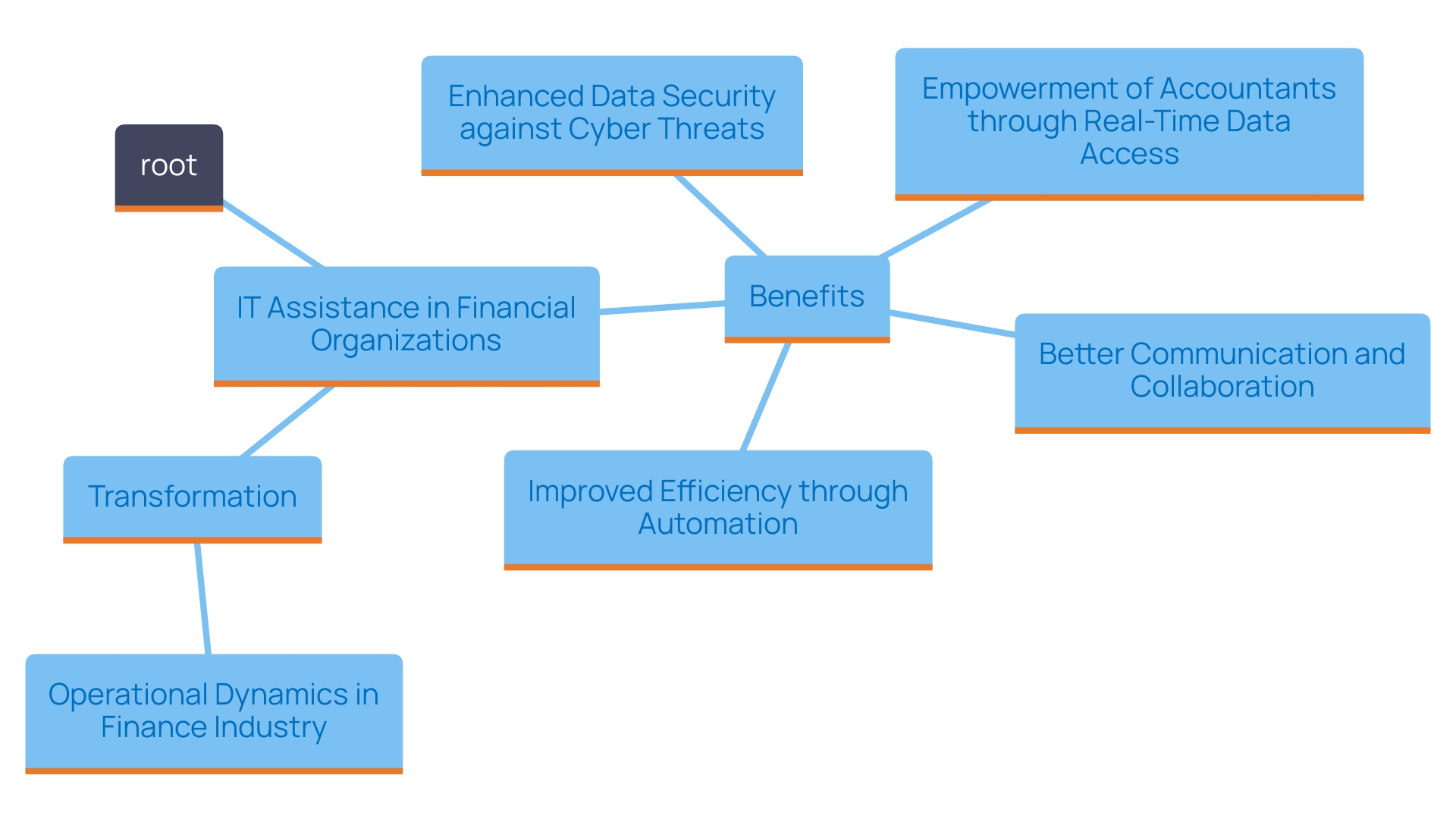
Essential Features of IT Services for Accountants
The essential characteristics of IT services for accountants have evolved significantly, with cloud-based financial solutions at the forefront. These platforms provide secure data storage and effortless access from any location, enabling accountants to manage records efficiently. Integrated software solutions that encompass invoicing, payroll processing, and tax preparation play a crucial role in enhancing productivity and accuracy within accounting firms.
Additionally, robust cybersecurity measures, including advanced data encryption and multi-factor authentication, are vital in safeguarding sensitive financial information against potential threats. The increasing reliance on technology also emphasizes the need for comprehensive support services such as helpdesk assistance and regular system maintenance, which are critical for ensuring uninterrupted operations.
Recent trends highlight the transformative impact of cloud technology in the financial sector. According to industry reports, 75% of accounting practices utilizing cloud solutions reported revenue increases, while 73% noted profit growth over the past year. This growth is attributed to factors such as an increase in client numbers and the introduction of new offerings. Moreover, outsourcing non-core tasks has become a strategic decision for many companies, enabling them to concentrate on high-value consulting offerings. Significantly, 98% of companies have outsourced at least part of their work in the past year, with financial statement preparation and general ledger management being among the most frequently outsourced services. Such strategies not only enhance scalability but also improve risk management and compliance, positioning firms to thrive in a competitive landscape.
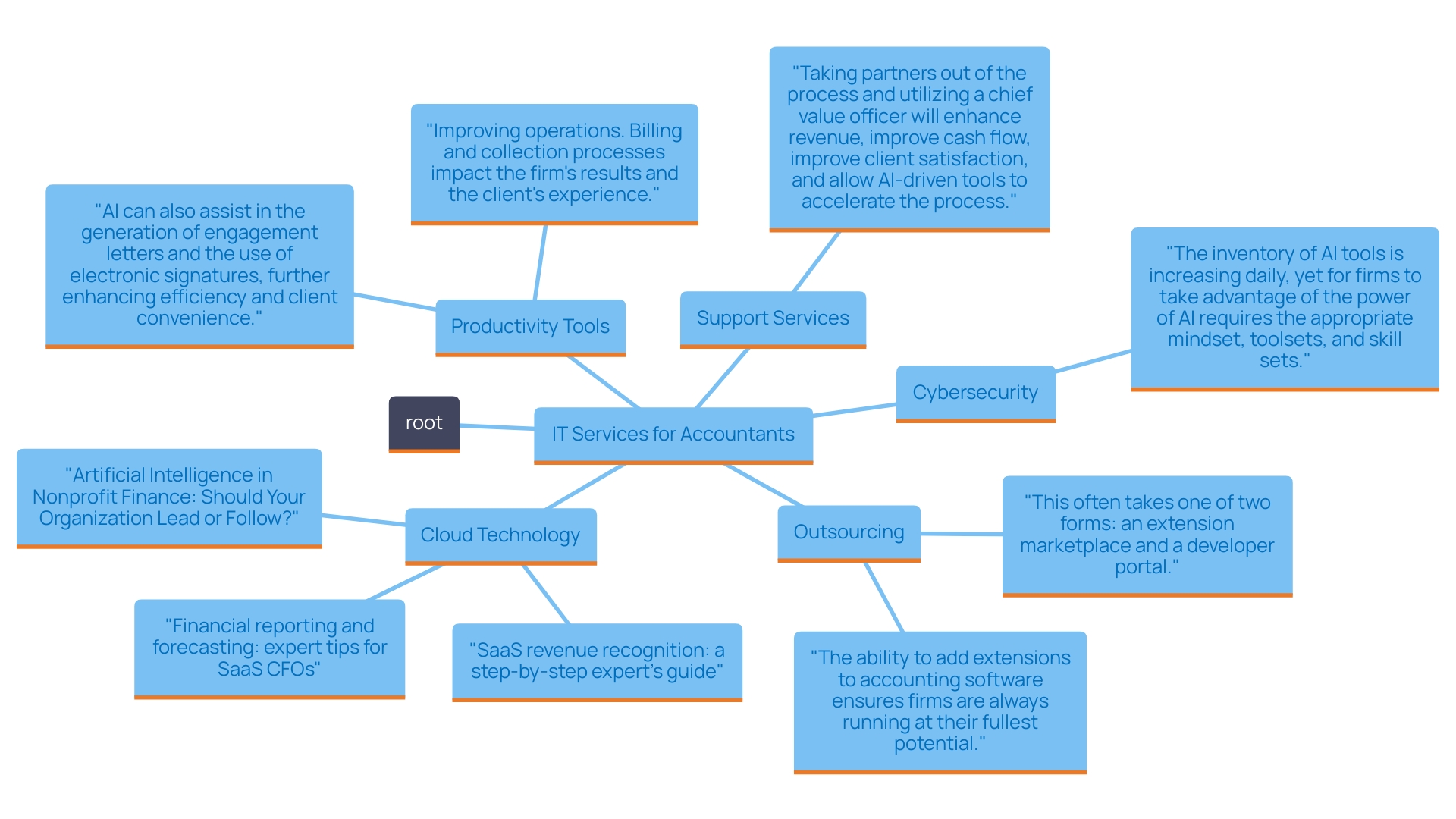
Choosing the Right IT Support for Accounting Agencies
Choosing the appropriate IT support for financial agencies is a multifaceted decision that significantly influences operational efficiency and compliance adherence. Firms must first assess their unique requirements, which may include the complexity of their financial operations, the volume of transactions processed, and stringent compliance obligations dictated by regulations such as Know-Your-Customer and Anti-Money Laundering. An ideal IT partner should possess a robust understanding of accounting technologies and demonstrate a proven track record in the industry.
It is crucial to evaluate the range of services offered by potential providers, which should encompass not only technical support but also ongoing training to ensure staff are well-equipped to navigate the evolving technological landscape. The importance of continuous education cannot be overstated, especially in a sector that frequently mandates compliance training to keep pace with international regulations.
Moreover, companies should seek scalable IT solutions that align with their growth trajectories and changing operational goals. As highlighted by recent industry reports, practices leveraging cloud-based technology have witnessed impressive revenue increases, with 75% of surveyed firms noting higher profits. The ability to adapt technology solutions as the business evolves is key to maintaining a competitive edge. Ultimately, a thorough vetting process that includes assessing the provider's communication skills and their approach to client relationships will ensure a partnership that is not only technically proficient but also culturally compatible.
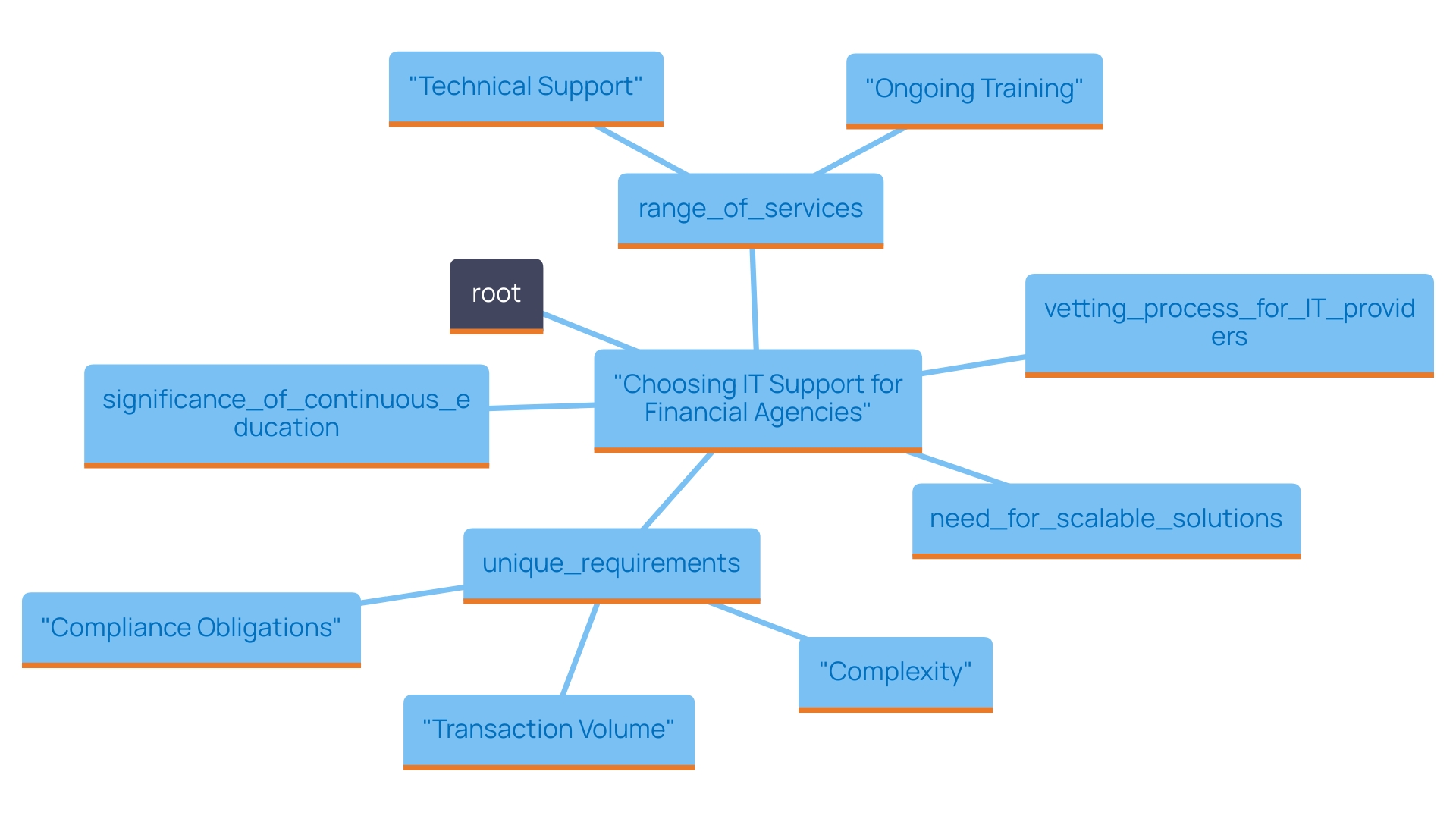
The Role of Managed IT Services in Accounting Efficiency
Managed IT solutions are essential for improving the efficiency of financial practices by providing comprehensive support and proactive management of technological resources. These offerings include regular maintenance, continuous system monitoring, and quick responses to technical problems, allowing financial professionals to focus on their main duties without the interruptions of IT management. By leveraging outsourced IT management, accounting firms gain access to specialized expertise and cutting-edge technologies without the added burden of maintaining an in-house IT team. This method not only assists in lowering operational expenses but also improves delivery and client satisfaction.
Moreover, the successful integration of managed services requires a robust communication foundation between client systems and vendor technologies. For financial services, especially small and medium-sized enterprises, guaranteeing smooth interoperability is crucial. This enables precise record-keeping, secure financial transactions, and effective management of business assets throughout different phases, from finance to distribution. As companies transition to cloud-based accounting solutions, the flexibility and agility these platforms provide become vital, especially in a landscape increasingly influenced by automation and artificial intelligence. By embracing these advancements, firms can not only streamline their operations but also empower their staff to focus on strategic decision-making, ultimately driving growth and enhancing the overall customer experience.
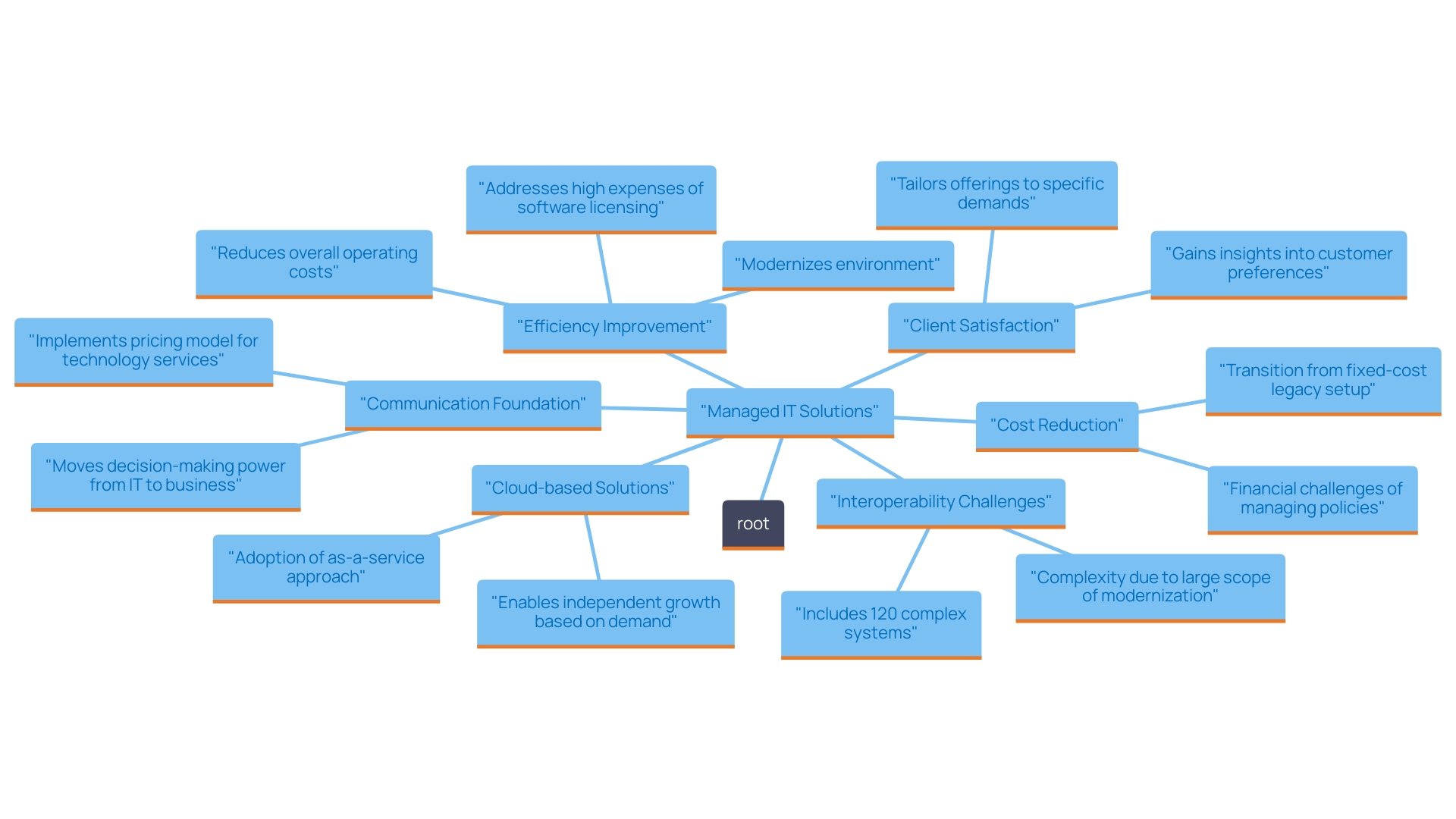
Conclusion
The integration of IT services tailored for accountants is no longer a luxury but a necessity in today's fast-paced financial environment. The article has explored how advanced technologies, particularly cloud computing, enhance operational efficiency by allowing accountants to access and manage financial data from anywhere. This flexibility not only streamlines workflows but fosters collaboration among teams, ultimately driving productivity and accuracy in financial reporting.
Moreover, the significance of robust cybersecurity measures has been underscored, emphasizing the need for comprehensive protection against rising cyber threats. With sensitive financial data at stake, adopting sophisticated IT frameworks ensures compliance with security standards, safeguarding both client assets and the firm's reputation. As firms increasingly leverage automation and artificial intelligence, the reduction of manual tasks empowers accountants to focus on strategic decision-making, adding greater value to their client relationships.
The strategic advantages of outsourcing have also been highlighted as a viable approach for accounting practices looking to scale their operations and enhance service delivery. By offloading non-core tasks, firms can concentrate on high-value advisory services, which are crucial for maintaining competitiveness in a rapidly evolving market.
In summary, embracing advanced IT services is essential for accounting firms aiming to thrive amidst economic challenges. By investing in the right technology solutions and support systems, firms can not only enhance their operational capabilities but also position themselves as trusted advisors in the financial landscape. As the accounting industry continues to evolve, those who proactively adopt these innovations will undoubtedly lead the way in delivering exceptional service and maintaining compliance in an increasingly digital world.




